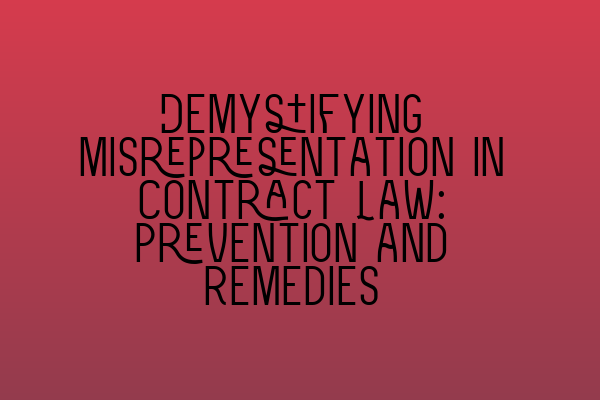Demystifying Misrepresentation in Contract Law: Prevention and Remedies
Misrepresentation is a concept that holds great significance in contract law. Understanding its nuances is crucial for solicitors, as it can greatly impact the validity and enforceability of contracts. In this blog post, we will explore what misrepresentation entails, how to prevent it, and the available remedies in case it occurs.
What is Misrepresentation?
Misrepresentation refers to a false statement of fact made by one party to another during contract negotiations. This statement can be made through words, actions, or even silence when there is a duty to speak. It is important to note that misrepresentation must be a statement of fact, not opinion or mere puffery. If a misrepresentation is made and relied upon by the other party, it can render the contract voidable.
There are three types of misrepresentation recognized in contract law:
- Innocent Misrepresentation: This occurs when the person making the false statement genuinely believes it to be true, without any intention to deceive. Although innocent misrepresentation does not give rise to a right to rescind the contract, it may provide the innocent party with a claim for damages.
- Negligent Misrepresentation: This occurs when the person making the false statement does so without exercising reasonable care to ensure its accuracy. Negligent misrepresentation can give rise to a right to rescind the contract and claim damages.
- Fraudulent Misrepresentation: This occurs when the person making the false statement knows it to be untrue or makes it recklessly, with intent to deceive the other party. Fraudulent misrepresentation allows the innocent party to rescind the contract and claim damages.
Preventing Misrepresentation
As a solicitor, it is essential to take proactive measures to prevent misrepresentation in contract negotiations. Here are some strategies to consider:
- Thoroughly investigate the facts and background information relating to the transaction.
- Encourage open and honest communication between the parties involved.
- Document all negotiations and agreements in writing to ensure clarity and avoid misunderstandings.
- Advise clients to seek independent legal and financial advice before entering into any contractual obligations.
Misrepresentation can have severe consequences for both parties involved in a contract. By following these preventive measures, solicitors can significantly reduce the risks associated with misrepresentation and protect their clients’ interests.
Remedies for Misrepresentation
If misrepresentation occurs and a contract becomes voidable, the innocent party may have several remedies available to them:
- Rescission: This remedy allows the innocent party to set the contract aside and be returned to their pre-contractual position. It effectively cancels the contract and restores the parties to their original positions.
- Damages: The innocent party may also seek damages to compensate for any losses suffered as a result of the misrepresentation. The amount of damages awarded will depend on the nature and extent of the losses incurred.
- Specific Performance: In certain circumstances, the innocent party may seek a court order requiring the party in breach to fulfill their contractual obligations. This remedy is typically sought when the subject matter of the contract is unique or when monetary compensation is not an adequate remedy.
It is important for solicitors to carefully assess the circumstances of each case to determine the most appropriate remedy for their clients.
In conclusion, misrepresentation is a complex aspect of contract law that requires careful attention. By understanding its different types, taking preventive measures, and knowing the available remedies, solicitors can effectively navigate this legal terrain and protect their clients’ interests. For more information on other legal topics, feel free to check out our related articles:
- Barrister vs. Solicitor: A Comprehensive Comparison
- Embracing the Rise of Virtual Law Practices
- Unveiling Real-Life Case Studies: Insights into Legal Practice and Decision-Making
- Exploring Solicitor Salaries in the UK: Average Earnings and Factors Affecting Income
- Mastering Client Relationship Management: Skills for Solicitors to Enhance Trust and Loyalty
Thank you for reading this blog post. If you have any questions or require legal assistance, please do not hesitate to contact us.
